A MOVEABLE FEAST
A Lesbos Sojourn: From the tree to the table
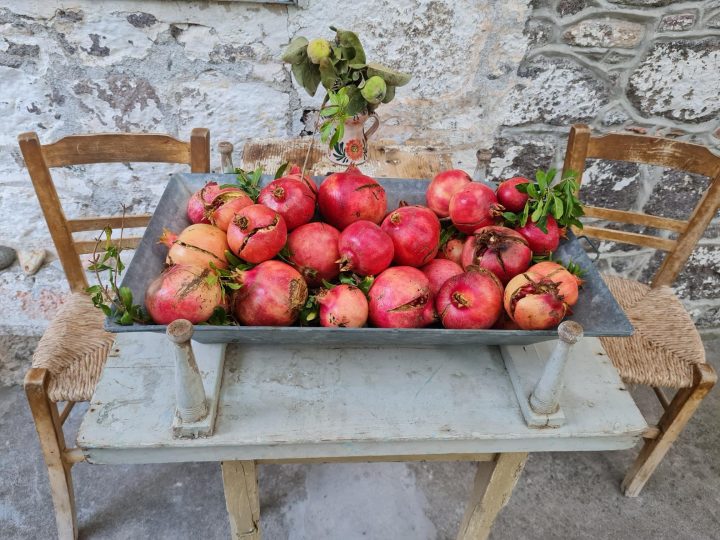
A Mediterranean autumn really is a ‘season of mists and mellow fruitfulness’. We have been making full use of this fruitfulness in our travels to the furthest tip of Europe, a Greek island just a stone’s throw from Turkey.
It all started with an apple. As it always does, ever since Biblical times. Or, in this case, with a whole lot of apples in a big old tree in my French mother-in-law’s garden.
We passed belle-maman Francine’s house in a village close to Lille as part of our extended road trip, and she invited us to pick some apples to snack on in the car. Unlike Eve in the Bible, I’ve never found a raw apple on its own tempting, but I love using apples in the kitchen, in salads or tarts or side dishes. And because you don’t look a gift horse in the mouth – especially not if the gift comes from your mother-in-law – I collected a big bag of apples and took it to the house of another family member who hosted us for a couple of nights.
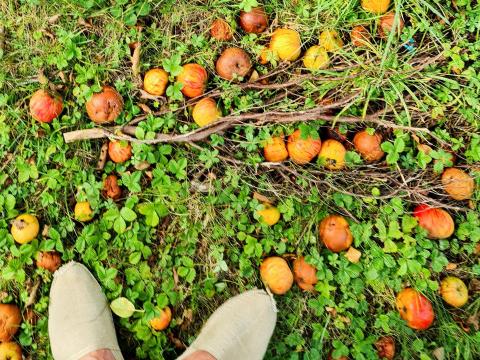
Apples falling from the tree in Belle-Mamam’s garden. (Photo: Marita van der Vyver)
Here we baked our favourite salty apple tart, with caramelised onions and crispy bits of bacon, served it with a green salad, and appreciated every bite because we knew that for the next month we wouldn’t be spending much time cooking or baking as we meandered southwards through France, Switzerland, Italy and Greece.
During this slow road trip I kept spotting autumn fruit along the way, colourful apples and quinces and pomegranates hanging on green branches like baubles in a Christmas tree. I wished I could harvest some of them for cooking purposes, as I would have done at this time of the year if I still had my beloved blue-walled kitchen in France. I know, I know, if we hadn’t sold our house, we wouldn’t have been able to afford this nomadic adventure. Choosing means losing, always.
But still, I really missed my kitchen.
So by the time we arrived on the Greek island of Lesbos, where we’re renting a little house with blue shutters and a sea view through every window for a whole month, we were delighted to have a kitchen again. More a cooking corner than an actual kitchen, just a small gas stove on a marble counter, no oven or microwave, no electric mixers or blenders or any modern gadgets, only two pots and two pans in the cupboard.
But with these bare essentials – and the free fruit falling from trees all over the island – we’ve once again realised that homemade food can be a joy that has very little to do with money or luxurious kitchens. We’ve become especially imaginative with the king and queen of autumn fruit in a Mediterranean climate: the strangely shaped yellow quince and the perfectly rounded red pomegranate.
On the very first day, picking up the keys of The Blue House from our friend Elizabeth – an Afrikaans-English-French-Greek woman who jumps between four languages with the joy of a child playing hop-scotch – we were literally stopped in our tracks by the branches of a stately pomegranate tree hanging over the path to her front door. We had to bow, as for royalty, to pass under a branch. A show of respect for the ripe fruit that shone like red Chinese lanterns in the deep green shade of the garden.
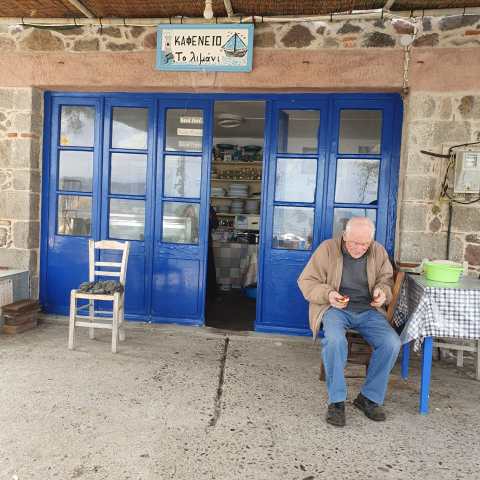
The old man shaking seeds out of his pomegranates. (Photo: Marita van der Vyver)
Elizabeth gave us three big bursting pomegranates, and in the following days other people on the island also welcomed us with this seasonal gift. Sometimes they were total strangers, like the aged couple we greeted one Sunday afternoon as we walked past their house-and-taverna in an isolated bay. There were no other human beings in sight, just dozens of cats. While the husband was patiently removing the seeds of some pomegranates, the wife tried to convince us to eat lunch at one of the deserted tables. Neither of them spoke a word of English, and since our Greek vocabulary consists of about five words, we had to rely on gestures to explain that we’d already eaten.
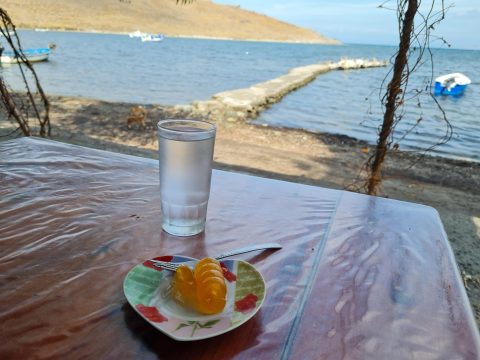
A little Greek sweetness reminding me of my mother’s makataankonfyt. (Photo: Marita van der Vyver)
Maybe she thought our exaggerated stomach rubbing meant we were still hungry, because she refused to let us go without at least tasting something sweet. She served us coffee and two shiny orange titbits made from what sounded like kolokhitakia (which we later learned meant squash or pumpkin or butternut) in a sticky syrup. The texture reminded me of my late mother’s sorely missed makataan or field melon conserve, although the form of the Greek dessert was more elegant, a dainty curl of a confection rather than a fat chunk of konfyt.
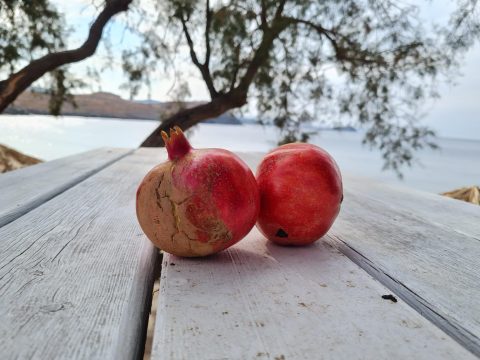
Pomegranates from a stranger who wanted to feed us. (Photo: Marita van der Vyver)
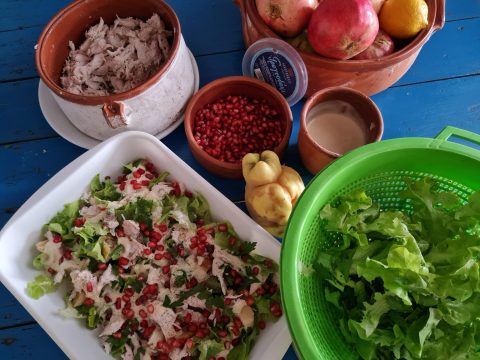
Chicken salad with pomegranate seeds. (Photo: Marita van der Vyver)
When we were finally allowed to leave, she presented us with two of the pomegranates that her husband was still deseeding in a corner. And once again, as so often happens on Lesbos, I heard the echo of Blanche DuBois’ final statement in A Streetcar Named Desire: “I have always depended on the kindness of strangers.”
Suddenly we had more pomegranates than we knew what to do with. We soon found new and sometimes quite unexpected ways of using them in the kitchen. We sprinkled the seeds over the thick Greek sheep’s milk yoghurt that we mixed with walnuts for breakfast, we fried pork chops with pomegranate juice and seeds, scattered seeds over quite a variety of salads – roasted beetroot salad, chicken salad, even a tuna salad. To our astonishment the tuna worked wonderfully well with the sweetness and the crunchiness of the seeds – a culinary experiment we would never have tried if we didn’t have all these pomegranates in a huge earthenware bowl on the blue kitchen table.
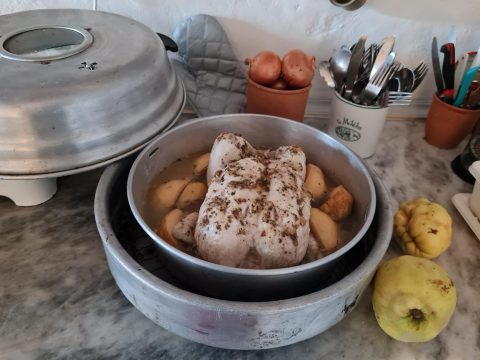
Chicken and quinces cooked in an eccentric kitchen contraption. (Photo: Marita van der Vyvver)
One night we invited some friends over for a Moroccan inspired meal of chicken and quinces (collected while exploring the island) cooked with honey, cinnamon, ginger and almonds. This time we didn’t use pomegranate seeds in the main dish, but we still managed to incorporate the seeds in the dessert. I invented a Greek version of an easy tiramisu, naming it Greekamisu, with the ubiquitous sesame seed biscuits sold at every bakery on the island as the base (dampened with a few drops of Greek coffee), replacing the mascarpone and cream with the creamiest yoghurt I could find, mixing the yoghurt with honey and cinnamon, and decorating the top layer with glistening pomegranate seeds – what else?
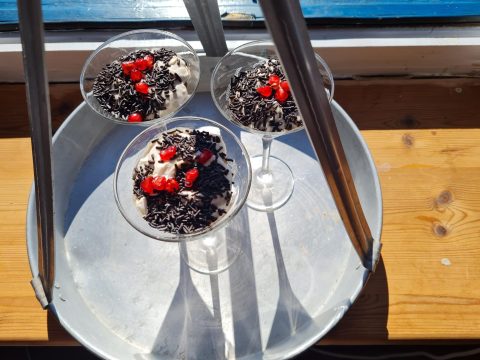
My Greekamisu. (Photo: Marita van der Vyver)
We liked our Greekamisu so much that we’ll be making it again, and not only while we’re in Greece.
Perhaps the biggest asset of a pomegranate is the sheer beauty of its seeds, these jewel-like scarlet drops that can turn any simple dish into a feast for the eyes. While its companion in the bowl on our kitchen table, the knobbly yellow quince, is appreciated above all for its odour. Even if we don’t eat all the quinces we collected, their sweet aroma can disguise other less desirable kitchen smells.
Many scholars believe that the ancient quince was the original fruit in the Garden of Eden, which through mistranslations of Biblical texts became known to us as the apple that Eve couldn’t resist. Apparently you still find quinces in some parts of the Middle East that you can eat straight from a tree, without having to cook them to tenderness first.
Those on Lesbos have to be cooked, though – a task that became much easier once we discovered an old tin contraption with an electric cable in our rented house. It looks like the grandmother of the electric frying pan I used to cook in as a student, before every kitchen corner had a microwave oven. It doesn’t have a thermostat, just a small cracked glass “window” in the lid, so cooking times become a guessing game, almost like cooking on an open fire outside. We thought we might as well try it out by baking some quinces. If the dish flopped, well, we could always go and pick some more quinces from a tree.
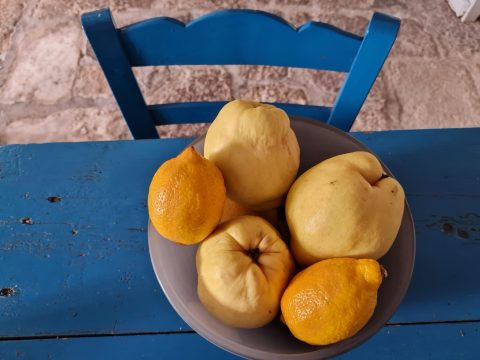
Sweet odour of quinces from our kitchen corner. (Photo: Marita van der Vyver)
To our delight the quinces were baked to perfection. A few days later we were daring enough to bake them unpeeled, simply cut in quarters, this time together with a whole chicken. (As a lazy cook I am always looking for less labour-intensive ways to get food on the table, and peeling a quince is almost as hard work as peeling a pumpkin.) They tasted even better this way.
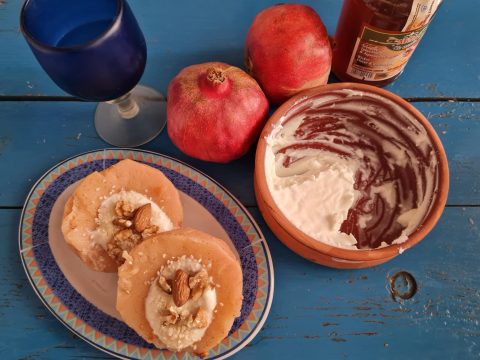
Baked quinces with yoghurt. (Photo: Marita van der Vyver)
We are nearing the end of our stay on a Greek island, alas, but there seems to be no end in sight of the “mellow fruitfulness” of our Mediterranean autumn. Our earthenware bowl is still filled with quinces and pomegranates, and even some early ripe oranges from a tree close to a monastery. Keats was referring to bees in his famous ode, To Autumn, when he wrote, “Until they think warm days will never cease/ For Summer has o’er-brimm’d”, but we are feeling like those lucky bees by now.
We shall continue enjoying fruit from the trees, as well as the glorious honey produced by the bees of Lesbos, and the yoghurt as creamy as the best ice cream, and all the other culinary delights until our last day here. And we hope to return in another season, when there will be new taste delights to discover. DM/TGIFood
The author supports Ladles of Love, an NGO feeding the hungry and providing healthy food in Cape Town. You can support them here LadlesofLove.






 Become an Insider
Become an Insider
Ag hoe lekker het ek nou gelees, met Mediterreense verlange. OK Engels verder vir fairness. I have missed with the sharpness of a French knife our annual sojourn to Mallorca, in the heart of the island, feels and smells like the Karoo, sheep and goats and olive trees and a fantastic vegetable garden with the best tomatoes in the world, thick skinned and impervious to insects. Freshly pulped for a proper Bloody Mary breakfast starter (yip, with bouillon). And the extraordinary largesse of village people, blood orange marmalade to freshly laid eggs, home smoked paprika reciprocated with what’s on the land. In summer there’s so much of everything the sheep & goats get the lion’s share from the garden. Covid. Maybe next summer. Oh, write during stage 4 load shedding, need to get the hell out of here just for a break and a different sky & sea. Groete.
Thanks for this message, Thys. Hope you may travel again soon… Marita
Thys, I posted that on Marita’s behalf.